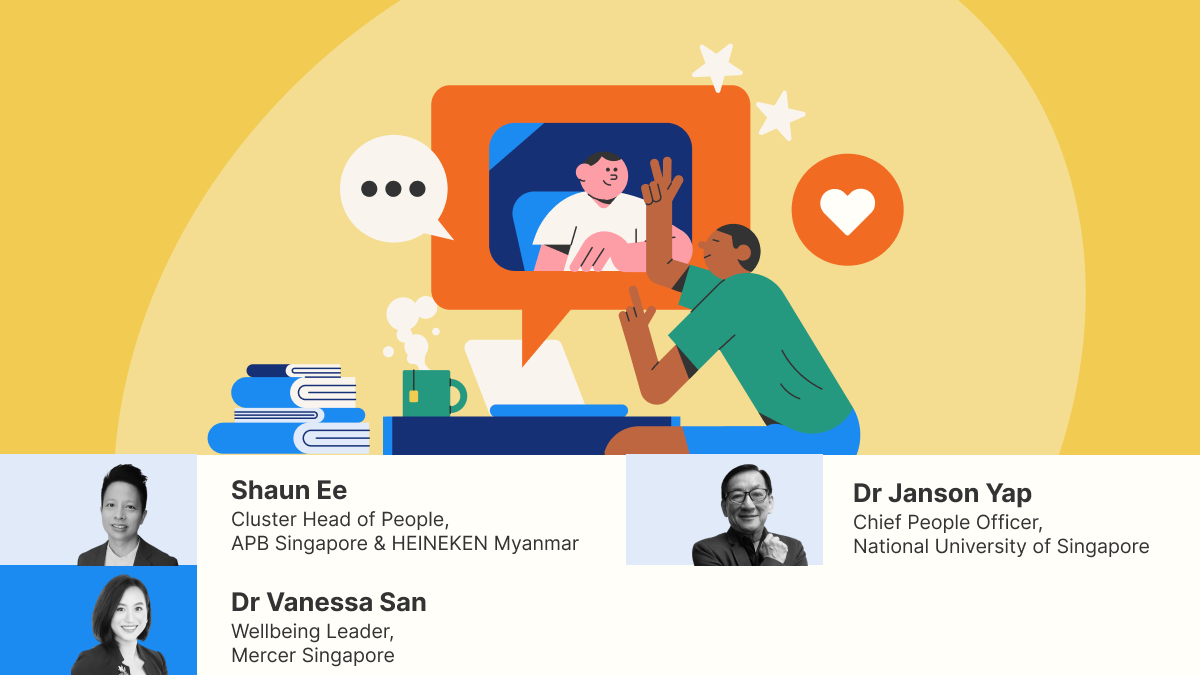As an employee, what would your ideal wellbeing programme look like? Is it access to coaching, counselling, and therapy? Complimentary gym memberships? Extended medical coverage? Unlimited paid time off?
The truth is that workplace wellness looks different to everyone. For companies, this throws up a critical question: how do you design and implement a wellbeing programe that adequately addresses the needs of diverse employee groups in your organisation?
At Intellect’s Mental Health Festival 2023, leaders from Asia Pacific Breweries Singapore, the National University of Singapore (NUS), and Mercer Singapore shared strategies to design and implement a wellbeing program that is both effective and sustainable.
Catch up on the session titled “Unlocking Effective Mental Wellbeing Rollouts for Diverse Audiences: From Campus to Corporation to Brewery” here:
Addressing culture and mindset at Heineken
Shaun Ee, Cluster Head of People at APB Singapore & HEINEKEN Myanmar, works with over 700 employees across offices, breweries, and trade. One key challenge he highlighted was the stigma surrounding speaking to line managers about personal and mental wellbeing.
To overcome this, the organisation focused on fostering a strong culture of open and honest conversations. They equipped line managers with the right tools to speak with their teams so that conversations are constructive and meaningful for all, which has helped build rapport and “emotional connection” within their workforce.
Shaun also addressed practical concerns when they were designing their wellbeing programme:
“We had to make sure that we were doing the right thing for our employees in terms of wellbeing, but also making sure that productivity and performance continued,” he said.
To ensure their wellbeing program was both holistic and actionable, they developed the High Life Framework which covers four pillars: professional (career development), emotional (mental wellbeing), social (employee engagement), and physical (healthy activities).

The company also makes an effort to ensure employees have equal access to the programs, by improving awareness and ensuring that working hours aren’t a barrier to participation. This ended up requiring some form of customisation for different employee groups.
“That’s the balance we’ve had to come to: organising different activities at different timings for different groups,” explained Shaun. “Almost like a ‘different strokes for different folks’ kind of approach.”
Making wellbeing a core tenet at NUS
Dr Janson Yap is the Chief People Officer at the National University of Singapore (NUS), where he oversees people policies and processes across staff, faculty, and students. He revealed that getting high-performing individuals to seek help can be an uphill task. After all, many have learnt to live alongside stress all their lives.
Employees need to have trust in their organisation. The university set out to build this trust by fully committing to their wellbeing efforts, establishing one of the largest health and wellbeing (HWB) teams in the country and spearheading campus-wide campaigns.
“We decided to invest big in mental wellness and wellbeing,” Dr Janson explained, sharing that there are now over 60 psychologists on the team, reducing waiting times and increasing accessibility for the broader population at NUS.
Fundamental to their efforts is the conviction that health and wellbeing are the core of any organisation’s—and by extension, society’s—success. As the saying goes, “No health, no wealth”, shared Dr Janson. Mental wellbeing doesn’t just affect performance at school or work, but all aspects of an individual’s life.
Understanding the unique needs of an hourly workforce
Many companies in Singapore and the region, especially those in F&B, logistics, and hospitality, employ an hourly workforce. Hourly workers have traditionally been excluded from benefits that full-time employees enjoy, but companies are increasingly realising that this is not sustainable, especially if these workers make up a significant portion of their workforce.

Dr Vanessa San, Wellbeing Leader Singapore for Mercer, brings over 20 years of expertise in the corporate and clinical fields. To design and implement a wellbeing program that reaches these workers, she recommended that companies start by analysing their needs and preferences.
What are their demographics, like age or language? Is their job physically strenuous? How open are they to speaking about their wellbeing to a counsellor or therapist? Would they prefer virtual-first or in-person care?
While basic benefits such as medical coverage should be included, Dr Vanessa also suggested providing healthier food options, transportation coverage, and even access to upskilling or mobility within the organisation. She also advised that it’s not always necessary to establish an entirely new wellbeing program for hourly workers, but rather look at existing programs that can be modified.
Organisations also have to consider how they communicate with their hourly workforce. Compared to full-time employees who may receive email notifications or HR communications, hourly workers may need different outreach and support efforts to increase awareness and participation.
Design and implement a wellbeing programme with Intellect
Rather than decide arbitrarily what goes into your wellbeing programme, consult your workforce first. What wellbeing looks like for one individual can be vastly different to another, the key is to identify overlapping needs. You may be surprised by what you find.

Only when an organisation truly understands their workforce on a personal level can it yield returns on its investment? Intellect Dimensions, a proprietary methodology measuring key aspects of employee experience, has helped organisations achieve a 14x ROI in just six weeks by lowering the costs of absenteeism and presenteeism.
Get in touch to find out how you can develop a wellbeing programme that caters to the specific needs of your organisation today.






